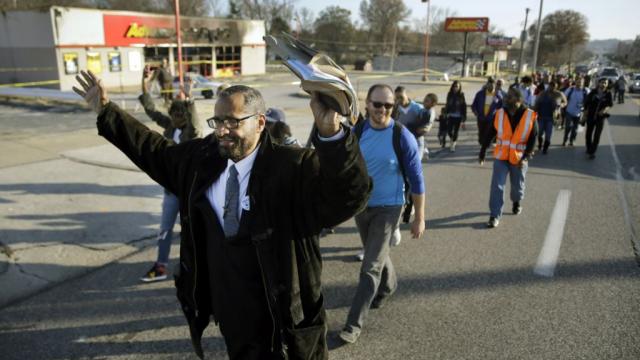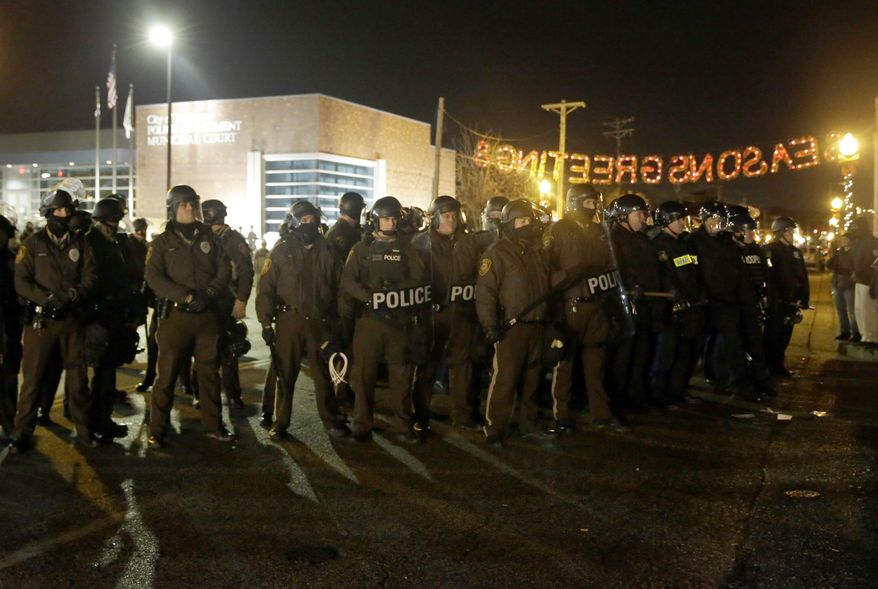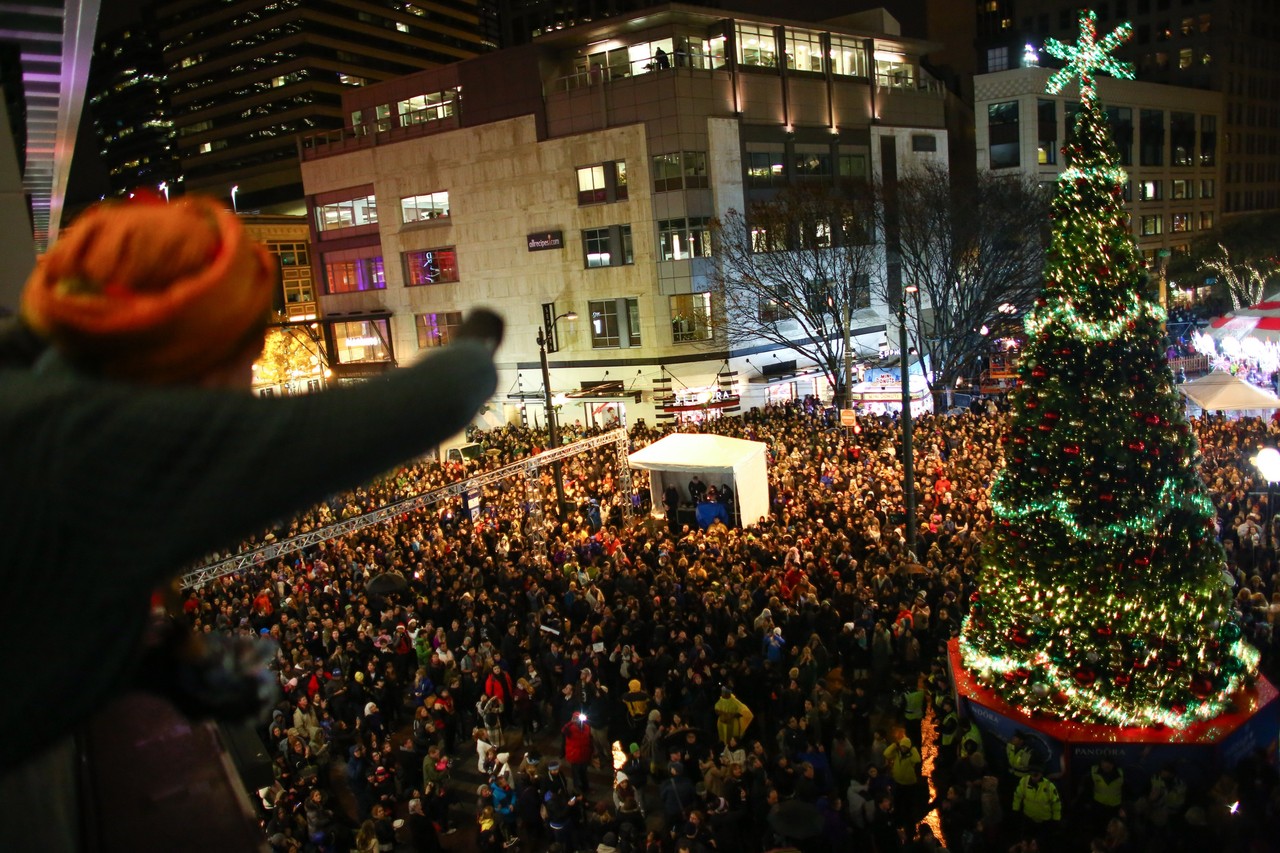
Activists gathered in Ferguson, Missouri, on Saturday to march 120 miles to the state capital, Jefferson City, to protest the killing of Michael Brown and a grand jury’s decision not to indict the white police officer who shot him dead.
The march, organized by the National Association for the Advancement of Colored People (NAACP), was set to begin midday on Saturday at the Canfield Green Apartments, the residential complex near where unarmed black teen Brown was shot on Aug. 9. by officer Darren Wilson.
Protests in Ferguson had dwindled in size in the days after the grand jury decision, but they regained energy on Friday as demonstrators closed down a St. Louis mall and targeted shopping areas on Black Friday.
In total, 16 people were arrested in the area on Friday night and early Saturday morning, according to St. Louis County Police Department media relations officer Shawn McGuire — only one of them was from Missouri. More than a dozen were arrested in Oakland, San Francisco and Seattle.
The NAACP march, which is reminiscent of the civil rights marches of the 1960s, was just one of a diverse set of protests this weekend against the Brown incident, which rekindled a national debate over race relations.
In New York City, a group of activists gathered in Harlem at what Theodora X, leader of activist group The Black and Hispanic Grandmothers Against NYPD Executions, said there has never been a conviction of an NYPD officer for killing an unarmed person of color.
“Black women will not allow NYC to be Ferguson, Missouri or 1963 Birmingham, Alabama,” she said in a statement.
Iris Baez, mother of Anthony Baez, a black security guard who died after being subjected to a chokehold by police in the Bronx in 1994, drew a connection between her own loss and that of Lesley McSpadden, Brown’s mother.
“The system set up that town for what happened,” she said. “I feel her pain.”
Calvin Hunt, a participant in the rally and Harlem resident, who was wearing a T-shirt with the image of a bull's-eye, said he had been targeted by policemen and beaten at the funeral of Eric Gardner — a black man who died at the hands of four cops who held him in a chokehold in New York in July. Hunt's two children, holding a protest sign at the rally, had witnessed the assault, he said. “The police are killing us at a rapid rate, and we’re not brought justice.”
In Chicago, similar grievances were aired when Malcolm London, a leader in the Black Youth Project 100, which has been organizing Chicago protests, said the group was rallying or more transparency from Chicago police. About 200 people gathered on Friday near the city's popular Magnificent Mile shopping district.
"We are not indicting a man. We are indicting a system," London told the crowd.
In Oakland, more than a dozen people were arrested after about 125 protesters wearing T-shirts that read "Black Lives Matter" interrupted rail service from Oakland to San Francisco. In San Francisco, protesters smashed windows and hurled bottles and other objects at police, leaving two officers injured. Dozens of people in Seattle blocked streets, and police said some demonstrators protested at a local shopping center.
Meanwhile, Naureen Khan reports for Al Jazeera America that while congressional lawmakers have urged calm, few are offering policy prescriptions in the wake of Ferguson protests:
As protesters around the country took to the streets to express their outrage over the grand jury decision in Ferguson, Missouri, lawmakers across the political spectrum urged calm — but offered few solutions or prescriptions for the long-simmering frustrations of the black community.
Many asked simply for restraint on the part of demonstrators and expressed sympathy for the family of Michael Brown, an unarmed black teenager shot by police officer Darren Wilson that has prompted a nationwide examination of racial biases in policing and the justice system.
"However disappointed we may be in the decision by the grand jury in St. Louis County, we must hold the family of Michael Brown in our hearts and reject the acts of violence and destruction that detract from the efforts of those who continue to peacefully protest this tragedy,” said House Minority Leader Nancy Pelosi, D-Calif., in a statement.
Rep. John Lewis, D-Ga., a prominent organizer in the civil rights movement of the 1960s, said on a radio show last week — before the grand jury decision was released — that he believed the outcome would mark a turning point for black Americans agitating for change.
“When we were beaten on that bridge in Selma, people couldn’t take it, for they saw it, they heard about it, they read about it, and it lit a sense of righteous indignation,” Lewis said, referring to the iconic march for voting rights from Selma to Montgomery where peaceful demonstrators were beaten by police. “When we see a miscarriage of justice in Ferguson, they’re going to have the same reaction they had towards Selma.”
Still, on Monday night, after the decision was made, Lewis called for peace in lieu of rage.
“I know this [is] hard. I know this is difficult. Do not succumb to the temptations of violence. There is a more powerful way,” he tweeted. “It’s good to disturb the order of things, to show signs of discontent, but it must be peaceful, orderly, and disciplined.”
Others were even more reticent in their comments and declined to criticize the grand jury’s decision.
“The rule of law is something that we have to put our faith in,” said New Jersey Sen. Cory Booker, a Democrat, at a public appearance in Jersey City. “There was a grand jury, they went through a process, evidence was presented for a jury and they came to that conclusion. I respect that conclusion.”
Booker nonetheless called for “massive reform” of the criminal justice system, although what such reform would entail remains unclear.
“It is a time for us to come together, whether through peaceful protest, activism, engagement and hard work to advance our country closer to the ideals of equal justice under the law,” Booker added.
Rep. Marcia Fudge, D-Ohio, chair of the Congressional Black Caucus, had stronger words and a dimmer view of what she saw as the systematic devaluing of black lives in the eyes of U.S. society.
“This decision seems to underscore an unwritten rule that black lives hold no value; that you may kill black men in this country without consequences or repercussions,” she said in a statement. “This is a frightening narrative for every parent and guardian of black and brown children, and another setback for race relations in America.”
Echoing the sentiment, Rep. Keith Ellison, D-Minn., tweeted simply, “Worried for my sons.”
Rep. John Conyers, D-Mich., offered some of the more comprehensive comments on what was needed after Ferguson, citing in a statement the Justice Department’s efforts to “cultivate community focused, smart policing that rebuilds trust between residents and law enforcement.” He called for more of those tactics, which amount to “ending use of racial profiling and use of excessive force.”
Conyers also spoke of the need for more accountability in the justice system.
“This result underscores the legal hurdles faced in holding the police accountable for abuse of authority and further illustrates the need for major reform in our criminal justice system,” he said of the grand jury’s decision.
Republican lawmakers, meanwhile, zeroed in on the social and economic conditions that allowed the unease in Ferguson to fester.
“Michael’s death was tragic, and the months since this tragedy have marked a challenging time in Ferguson and across Missouri,” said Missouri Sen. Roy Blunt, R-Mo., in a statement. “Together, I know we can move forward and heal as we work to find better job opportunities in and more investment for challenged communities.”
Sen. Rand Paul, R-Ky., meanwhile, laid blame on the policies of the “war on drugs,” which he believes vests too much power in the hands of the police, and the “war on poverty” for failing to cure economic blight, as he laid out a series of concrete proposals for reform.
“I will continue to fight to end the racial disparities in drug sentencing. I will continue to fight lengthy, mandatory sentences that prevent judges from using discretion. I will continue to fight to restore voting rights for non-violent felons who’ve served their sentences,” he wrote in an op-ed in Time.com. “But my hope is that out of tragedy, a preacher or teacher will arise — one who motivates and inspires all of us to discover traits, ambitions, and moral codes that have slowly eroded and left us empty with despair.”
3 WAYS TO SHOW YOUR SUPPORT
- Log in to post comments













